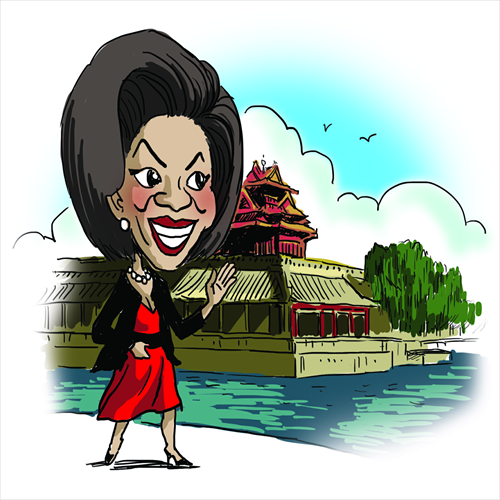HOME >> OP-ED
Michelle Obama's personal dedication visible on first lady tour agenda
Source:Global Times Published: 2014-3-18 20:08:01

Illustration: Liu Rui/GT
US first lady Michelle Obama kicks off her first China trip today. The itinerary includes a meeting with her Chinese counterpart Peng Liyuan, interaction with high school and university students, and visits to cultural sites.As her third solo overseas travel as the first lady of the US, Obama's China trip has inevitably led to speculations that she is attempting to compensate for her husband's absence from Beijing during his Asia trip in April.
But in fact, President Barack Obama is scheduled to attend the 2014 APEC Leaders' Meeting in Beijing in November, and it is unusual for a US president to visit a country more than once within a year. It is, therefore reasonable and justified for Barack Obama not to include China as a destination.
Media and public opinion tend to misinterpret and hype up Washington's deliberate estrangement from Beijing. It could be a possible reason that Michelle Obama has chosen to travel to China just before her husband's Asia tour in a bid to dampen negative speculations.
The first lady's trip is primarily aimed at fulfilling a commitment she made to her Chinese counterpart Peng Liyuan because she missed meeting Peng in June 2013 when Peng accompanied her husband President Xi Jinping for a summit in southern California.
Some US media outlets criticized her for the lack of diplomatic etiquette and negative influence upon Sino-US relations.
During her tour in three Chinese cities, Beijing, Xi'an and Chengdu, Obama is expected to focus on the power and importance of education for the young, which is a constant theme on her foreign trips.
She will shun political statements and engage in soft diplomacy, which may alleviate some conundrums in current bilateral relations.
Although Sino-US ties are determined by the strategic interests of the two countries, first lady diplomacy will definitely help the general public across the Pacific Ocean dispel misunderstandings.
Quite a few US media outlets and activists have been asking her to put forward China's human rights issues during her rare tour to China.
But even if she mentions the topic, that will not dominate her trip.
It is normal that the US intends to pay excessive heed to China's weaknesses because it is in an advantageous position regarding human rights protection and we are indeed fraught with many quandaries in the current development stage.
China should adopt an assertive stance, as we have been making progress in improving the human rights situation. We should be poised to respond to their queries in a calm and positive way.
As Obama has planned her trip at the invitation of Peng Liyuan, this instance of "first lady inviting first lady" will carve a new diplomatic pattern in the international community.
Obama's solo travel is closely related to her strong personality and Washington's deliberating influence on the world stage. It is more of an individual case than an example for the worldwide diplomatic paradigm.
There is no denying that soft power, including public diplomacy, is gaining a firmer foothold in a globalized and interdependent world where the use of hard power, especially warfare, will incur immense costs for a country.
China should embrace this experience and give full play to the role of public diplomacy.
The article was compiled by Global Times reporter Wang Xiaonan based on an interview with Jin Canrong, associate dean of the School of International Studies, Renmin University of China. wangxiaonan@globaltimes.com.cn
Posted in: Viewpoint